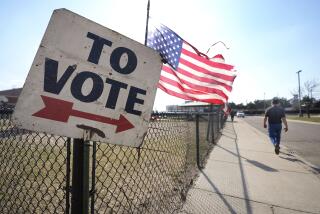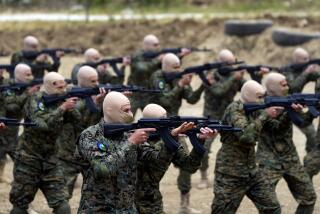Libyan Americans feel caught in the middle
When the U.N. Security Council voted in March to authorize international airstrikes on Libya, the women of the Herwees household in Cypress erupted in cheers and ululations.
Within minutes, Tasbeeh Herwees, a 19-year-old USC student, posted on her blog: “group hug everyone seriously so much love right now.”
“My friend called me and we were like ‘God is great.’ It was like someone had just gotten married,” said Herwees, whose parents are both Libyan immigrants. “It was a very jubilant atmosphere.”
In the weeks leading up to that vote, which authorized the U.S. and its allies to mount airstrikes in support of the uprising against Libyan leader Moammar Kadafi, Herwees had tried to reconcile herself to the odd position in which she and other Libyan Americans found themselves.
“It was some weird alternative reality where you’re asking people to throw bombs on your own country,” she said.
Beyond the conflicting emotions, Libyan Americans also have had to contend with anger from other Arab Americans who, mindful of the continuing U.S. role in Iraq, are wary of Western intervention in another oil-rich Middle East country.
As uprisings against decades-old dictatorships, along with a feeling of Arab unity, spread across the region this spring, U.S. immigrants from various Middle Eastern nations attended rallies supporting the revolutions. But disagreement over the Western intervention in Libya, which both the Arab League and Gulf Cooperation Council voted to support, has divided Arab Americans.
Given the brutal history of Libya under Kadafi, many Arab Americans were excited when the revolution began, said Jamal Nassar, who serves on the editorial board of the Arab Studies Quarterly, an academic journal focusing on the Middle East. But as the call for a no-fly zone grew louder, many began to have doubts.
“Because of the long history of Western colonialism, there is a lot of baggage that comes from the last few decades,” said Nassar, a political scientist who is dean of the College of Social and Behavioral Sciences at Cal State San Bernardino. “Actually, the last century.”
Esam Omeish, head of the political committee of the Libyan Council of North America, a group formed to support the Libyan uprising, said its members knew their advocacy of intervention would invite criticism from fellow Arabs, but that such criticism was still disheartening.
He said he and other anti-Kadafi activists met with members of President Obama’s security council several times to lobby for intervention, but he worried that others opposed to military action would drown them out.
“We even engaged many of them to say, ‘Listen, back off, we need all this support,’ ” said Omeish, who grew up in Tripoli and immigrated to the U.S. when he was 15. “We expected some hesitancy, but what should not have happened was any outspoken opposition to it, because that’s not consistent with the necessities on the ground. This is about saving lives.”
Before and after NATO airstrikes began March 19, James Zogby, president of the Washington-based Arab American Institute, cautioned against U.S.-led involvement in Libya, a position he said reflected concerns in the Arab American community.
“If the Arab League had sent troops in, I think people would have been completely unambivalent about it,” Zogby said. “The fact that it’s the colonial powers who were responsible for the mess the region is still fighting itself out of does create some problems.”
And Western involvement in Libya changes the empowering narrative of the revolutions, one that had been about Middle East reform through popular uprisings, he said.
“This isn’t people liberating themselves. This is a very different situation,” Zogby said. “It alters the course of the movement.”
Asma Saad of Irvine is a founder of the Southern California Libyan Task Force, a newly formed anti-Kadafi organization. She said she had heard from many Arab American friends who support the Libyan rebels but not the NATO airstrikes, especially since some civilian casualties have resulted.
But Saad, who was born in Benghazi and left when she was 2, said without the intervention, many more would have been killed.
“The people who have been the least understanding have been the Arabs. They are in shock that Libyans want intervention,” she said. “There were days I would actually cry about it: Why would people not understand our situation?”
More to Read
Start your day right
Sign up for Essential California for news, features and recommendations from the L.A. Times and beyond in your inbox six days a week.
You may occasionally receive promotional content from the Los Angeles Times.







